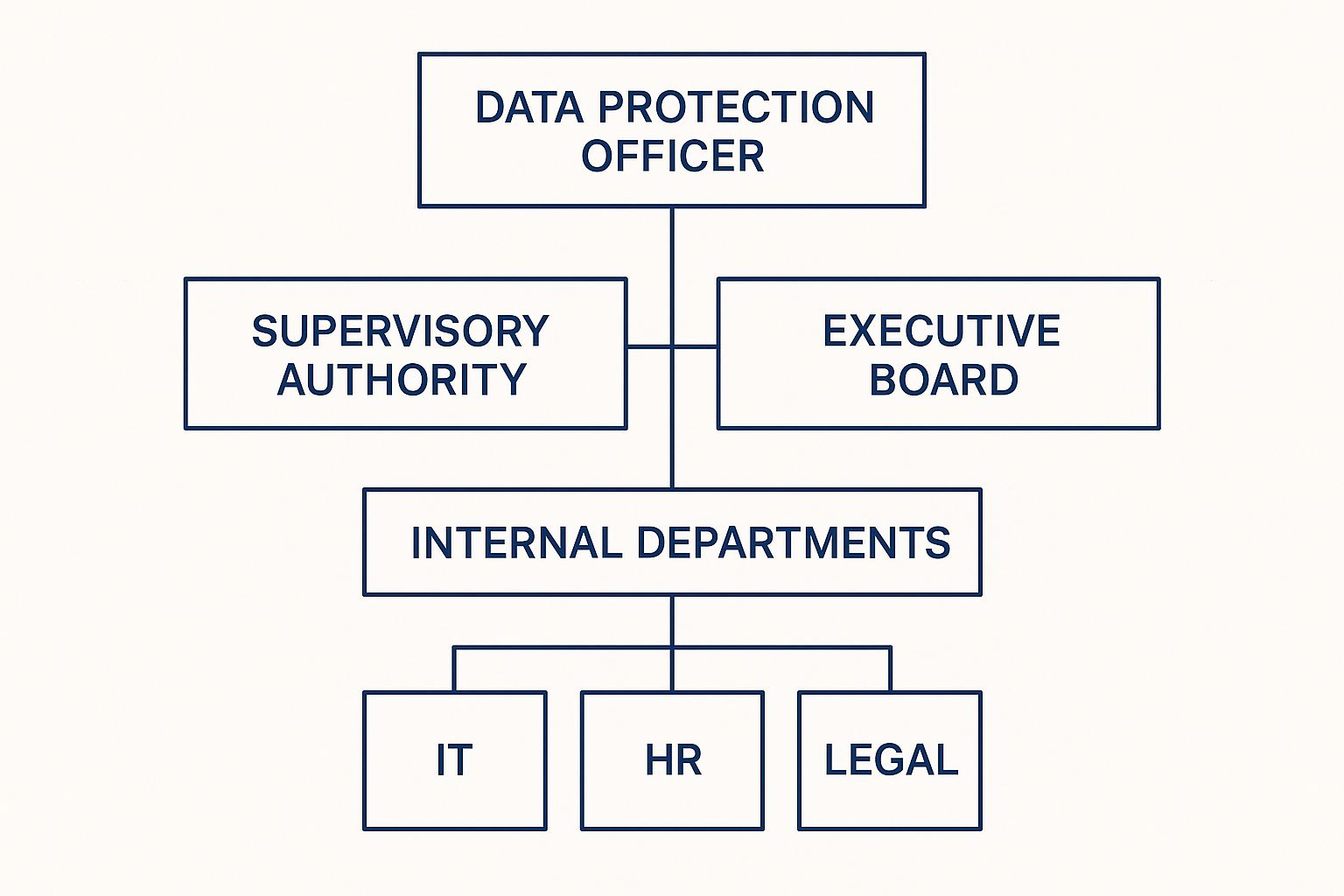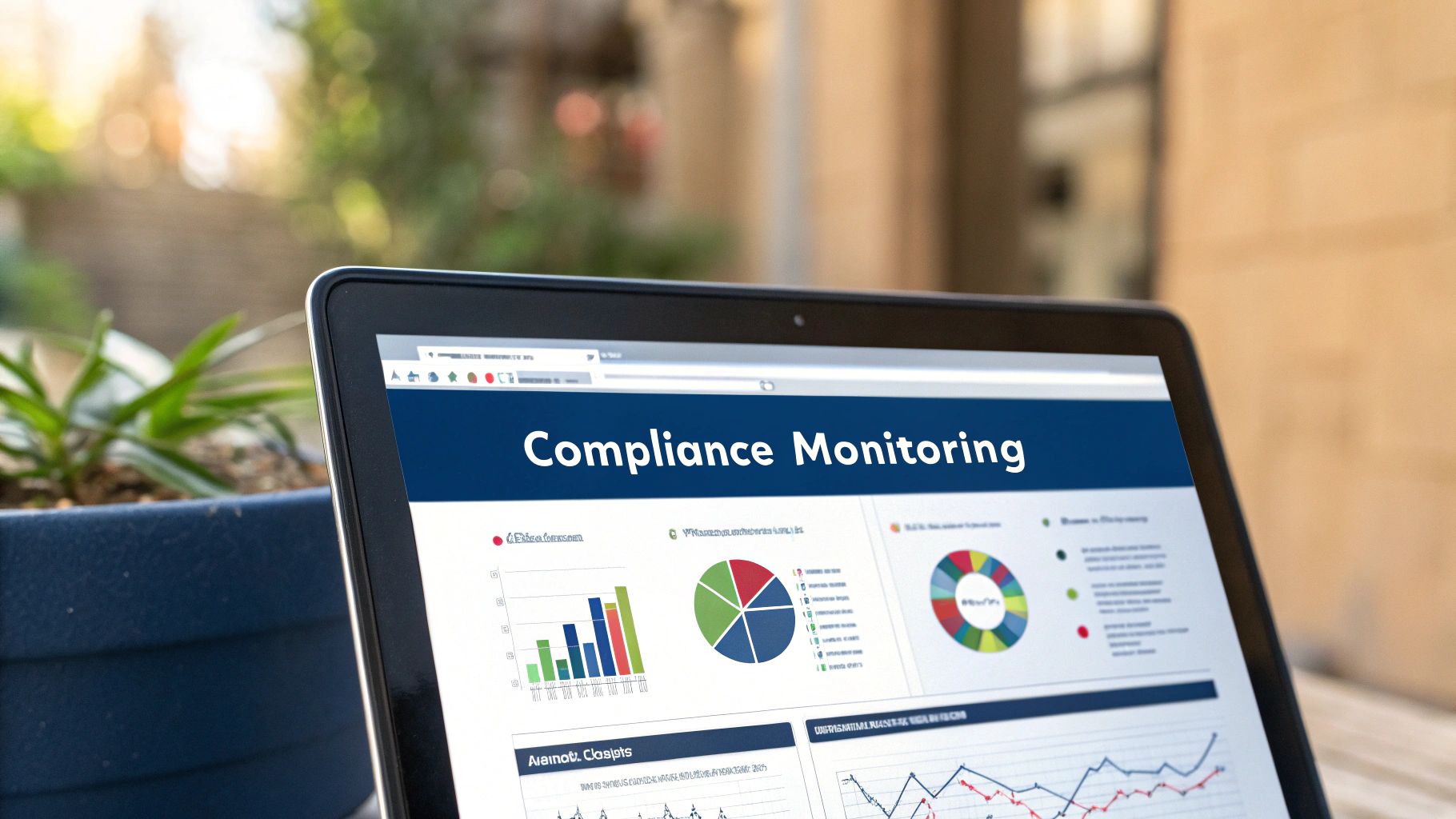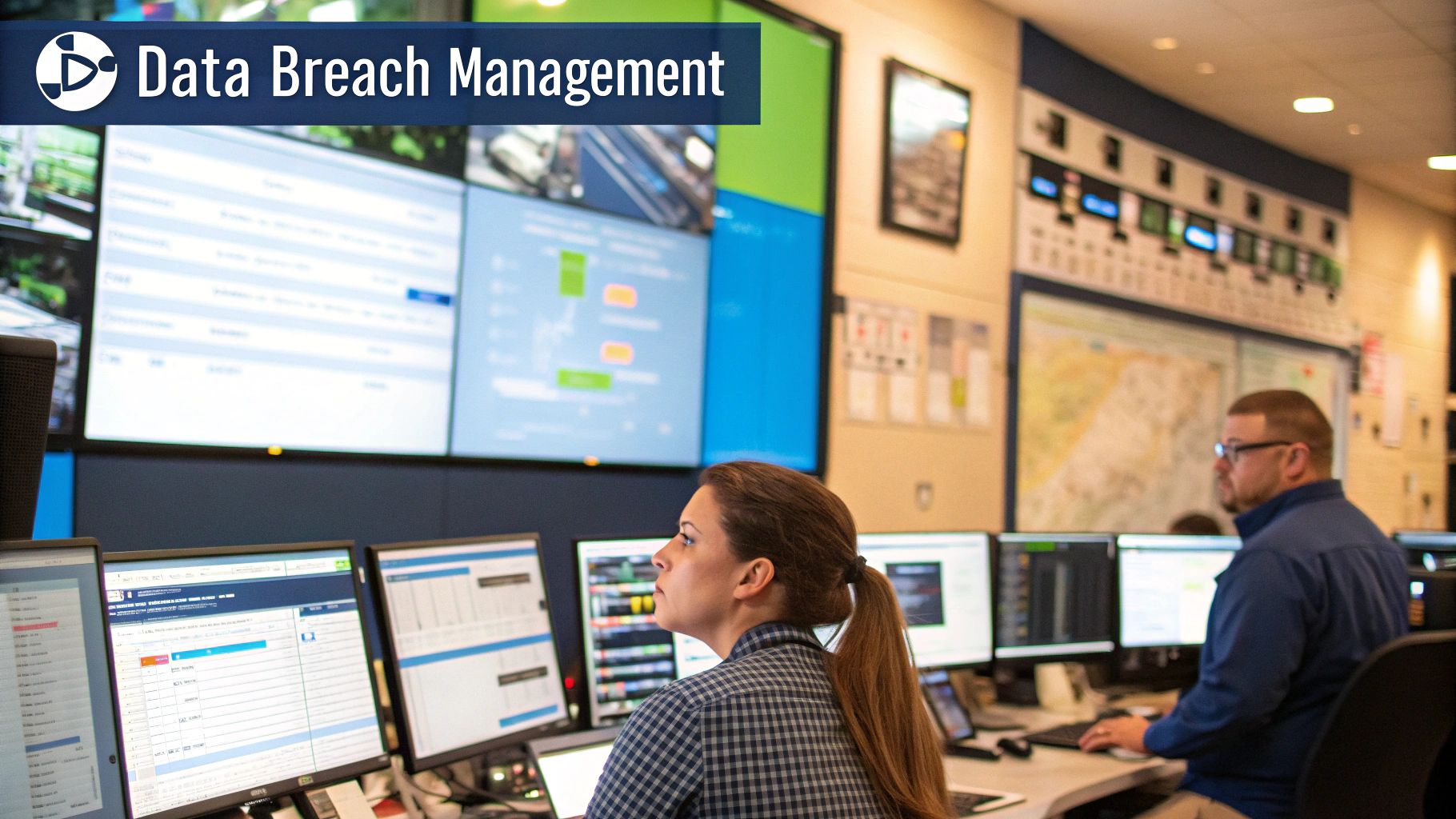Data Protection Officer Responsibilities: Key Duties & Skills
At its heart, the role of a Data Protection Officer (DPO) is to independently make sure an organization is playing by the rules of privacy law. They advise on best practices and serve as the go-to person for both regulators and individuals whose data is being processed. Think of them as the strategic guardians of personal data, always monitoring compliance and looking for ways to reduce risk.
The Modern DPO: Beyond the Rulebook
In the past, compliance roles often got a bad rap. They were seen as the internal police, enforcing rules and sometimes getting in the way of progress. But the modern DPO has moved far beyond that old-school view. Today’s DPO is the strategic ‘data conscience’ of an organization—a guide who helps the company navigate the tricky landscape of global privacy rules without killing innovation.
They're less of a gatekeeper and more of an architect. Their real mission is to weave data protection into the very fabric of how the company works. This proactive mindset ensures privacy isn't just a box to check at the end of a project, but a core piece of every new system, process, and business idea from day one.
Shifting from Compliance Cop to Strategic Partner
The role has made a crucial pivot from a reactive, checklist-driven job to that of a proactive, strategic partner. This shift is vital because data isn't just a business byproduct anymore; it's a core asset. A DPO's advice directly shapes how a company earns and keeps the trust of its customers.
This strategic change involves a few key things:
- Future-Proofing the Organization: They keep an eye on the horizon, anticipating new data risks from emerging technologies and upcoming regulations to get the business ready for what’s next.
- Enabling Business Goals: Instead of just saying "no," a great DPO finds compliant ways to help the business meet its goals. They turn potential privacy roadblocks into a real competitive edge.
- Building a Culture of Privacy: They champion data protection awareness everywhere, from the marketing team to the product developers, making sure everyone understands their part in protecting information.
A truly effective DPO doesn’t just read the law; they translate it into a strategic advantage that builds consumer confidence and long-term business resilience. They’re the bridge between legal requirements and operational reality.
The Foundation of Trust and Innovation
By integrating privacy from the get-go, a DPO helps put powerful frameworks like Privacy by Design into practice. This approach is all about proactively embedding privacy into the design of IT systems and business processes, and it’s fundamental to their work. To learn more about how this works, take a look at our guide on the core Privacy by Design principles.
Ultimately, a DPO's job is about much more than just avoiding fines. It's about building a trustworthy data ecosystem where customers feel secure and the business has the freedom to innovate responsibly. This sets the stage for a closer look at the specific duties that make this role so essential.
Understanding The Legal Mandate Of The DPO

Before May 2018, data privacy roles were often an afterthought. Then the EU rolled out its General Data Protection Regulation, and suddenly appointing a DPO became a legal requirement for many organizations. No longer a “nice to have,” this role carries real authority—anchored in law—to oversee how companies handle personal data.
Think of the DPO as both a navigator and a lighthouse keeper. They chart the course for data protection and warn of rocky legal shoals ahead. This legal backbone is what empowers them to guide, monitor, and report on data processing. Grasping this mandate is the first step toward mastering data protection officer responsibilities.
Curious about the official duties spelled out by regulators? Check the EDPS DPO Guide.
Triggers For Mandatory DPO Appointment
Not every business needs a DPO, but certain activities flip the switch. Imagine legal tripwires—step over them and you must hire a DPO.
- Public Authorities: Nearly all government bodies must have a DPO. Accountability in the public sector is non-negotiable.
- Large-Scale Systematic Monitoring: If your core operations include tracking people’s online behavior or surveilling public spaces, you’re in this category.
- Large-Scale Processing Of Sensitive Data: Handling health records, ethnic origin, religious beliefs, or criminal histories on a big scale triggers the requirement.
Ignore these triggers at your peril. Failing to appoint a DPO when one’s warranted can lead to hefty fines. You can review a more detailed breakdown of these legal requirements in our ultimate GDPR compliance checklist.
The Mandate For Independence And Authority
Independence is the DPO’s lifeline. They must operate without interference, free to call out risky practices even if it ruffles feathers.
The DPO acts as an unbiased advocate for individual privacy. They challenge processes that threaten data subjects and ensure every recommendation is rooted in compliance and fairness.
Key Pillars Of DPO Independence:
- Reporting To The Highest Level: Direct access to the board of directors or CEO ensures the DPO’s voice reaches decision-makers.
- Freedom From Conflicts Of Interest: A DPO cannot wear another corporate hat—so no pairing this role with Chief Marketing Officer or Head of IT.
- Protection From Dismissal: Legal safeguards mean a DPO can’t be penalized or fired for doing their job. Honest feedback must never carry a career penalty.
This framework turns the DPO into a robust safeguard rather than just another advisor. With clear independence and authority, they keep data protection front and center, driven by ethics and legal duty instead of purely commercial goals.
Breaking Down The Core DPO Responsibilities
So, what does a Data Protection Officer actually do all day? Far from just being a policy expert, a DPO is on the front lines, navigating the practical, day-to-day challenges that keep personal data safe and business operations running without a hitch.
Let's break down these core data protection officer responsibilities into what they look like in the real world—from monitoring compliance and running impact assessments to acting as the crucial link between all your stakeholders.
The diagram below gives you a bird's-eye view of where the DPO sits within an organization, connecting regulators, the executive board, and internal teams.

As you can see, the DPO is at the center of the action, liaising with the top brass and supervisory authorities while cascading essential guidance down to departments like IT, HR, and legal. It's a role that requires a unique mix of diplomacy and authority.
Monitoring Compliance
One of the biggest jobs for a DPO is keeping a constant watch on compliance. This isn't a one-and-done task; it's about making sure that every new tool, process, or project respects privacy rules from day one.
For example, when the marketing team wants to bring in a new automation platform, the DPO is the one who vets it. They'll scrutinize the data flows, pore over vendor agreements, and test security settings to ensure everything is above board.
This involves concrete actions like:
- Reviewing privacy policies and terms of service to make sure they align with current regulations.
- Mapping out how personal data moves between systems to catch any unauthorized sharing.
- Auditing system logs and reports in real time to spot unusual activity or access violations.
Key DPO Responsibilities And Actions
To make this even clearer, the table below neatly summarizes the core duties of a DPO and what those tasks look like in practice. It's a great cheat sheet for understanding the breadth of the role.
| Responsibility Area | Description | Example Action |
|---|---|---|
| Compliance Monitoring | Constantly reviewing systems and processes to ensure they meet data protection standards. | Vetting a new marketing tool by evaluating its data flows and testing its security configurations. |
| Impact Assessment Advising | Guiding teams through Data Protection Impact Assessments (DPIAs) to identify and mitigate privacy risks. | Leading a DPIA for a new HR analytics platform before it goes live. |
| Stakeholder Liaison | Serving as the main point of contact for regulators, data subjects, and internal teams. | Responding to data subject access requests and briefing the board on compliance status. |
This table shows how a DPO translates high-level principles into tangible actions that protect both the organization and its customers.
Advising On Impact Assessments
Before any new project that involves high-risk data processing gets off the ground, a DPO steps in to guide the team through a Data Protection Impact Assessment (DPIA). Think of it as a privacy stress test.
For instance, if HR wants to implement a new analytics platform to track employee performance, the DPO would lead a DPIA to map data flows, confirm the legal basis for processing, and identify steps to minimize any risks. This crucial step ensures high-risk activities are compliant before any data is ever touched.
To dive deeper into this process, check out our guide: data protection impact assessment playbook for GDPR success.
Serving As The Stakeholder Bridge
A DPO is the ultimate communicator, acting as the central hub between internal teams, the people whose data you hold, and regulatory authorities. They translate complex technical and legal details into clear, actionable guidance for everyone.
A huge part of this is building solid frameworks for data handling, which includes critical areas like digital asset management best practices. They might train the marketing team on opt-in rules, field questions from customers about their data, or coordinate breach notifications if an incident occurs.
An effective DPO prevents misunderstandings, ensures people get timely responses, and builds confidence in the company’s data practices.
Policy Development And Review
DPOs are the architects of your privacy framework. They are responsible for drafting and, just as importantly, updating privacy policies that cover everything from data retention periods to access rules and data minimization.
These policies aren’t static documents. They need regular reviews to keep them aligned with evolving laws, new technologies, and changes within the organization.
Key elements you'll always find in a DPO-led policy include:
- Data retention schedules that prevent the company from holding onto personal information for too long.
- Access control matrices that clearly define who can view, edit, or delete specific types of personal data.
- Data minimization criteria to ensure you only collect what is strictly necessary for a stated purpose.
Training And Awareness
You can have the best policies in the world, but they're useless if your team doesn't understand them. This is where the DPO becomes an educator, running regular training workshops to keep everyone sharp on their privacy obligations.
Since a staggering 88% of data breaches can be traced back to human error, this ongoing education is non-negotiable. The best DPOs make these sessions engaging with real-world case studies, interactive quizzes, and handy reference guides.
A few tips for making training stick:
- Keep modules short—under 15 minutes is ideal to hold attention.
- Use role-based scenarios that reflect the actual workflows and data your teams handle every day.
- Provide quick reference cards that summarize key privacy practices for easy access.
Incident Response Coordination
When the worst happens and a data breach occurs, the DPO takes the lead. They coordinate the investigation, dig into the root cause, and spearhead the remediation plan.
They are responsible for notifying the supervisory authorities within the tight 72-hour deadline and drafting clear, honest communications for the people affected. Swift and effective coordination can minimize reputational damage and show regulators you're accountable.
Vendor Management
Your data protection is only as strong as your weakest link, and that often means third-party vendors. A DPO ensures these partners meet the same high privacy standards through rigorous contract reviews and audits.
Key steps in their vendor oversight process include:
- Evaluating a processor’s security measures and compliance certifications.
- Negotiating crystal-clear data processing agreements that include the right to audit.
- Conducting periodic checks to verify vendors are sticking to the agreed-upon controls.
How Whisperit Supports These DPO Tasks
Whisperit's secure platform is built to make a DPO’s life easier. Features like detailed audit logs and end-to-end encryption give you the tools you need for effortless compliance monitoring.
Our automated templates guide teams through the DPIA process, cutting down on manual work and letting DPOs focus their attention on the highest-risk findings. Plus, secure messaging and role-based access controls make communicating with stakeholders and regulators a breeze.
By bringing documents, workflows, and audit trails into one place, Whisperit gives DPOs a clear, up-to-the-minute picture of their compliance status. This frees them up to focus on strategic guidance instead of getting bogged down in administrative tasks.
Navigating the Global Maze of Privacy Regulations

A Data Protection Officer's job rarely stops at their country's border. In our interconnected economy, data flows freely across continents, but privacy regulations definitely do not. This creates a complex and ever-shifting patchwork of rules that a DPO must expertly navigate to keep their organization compliant and trustworthy on a global scale.
Think of the DPO as an international diplomat for data. Their role isn't just to follow the rules at home but to understand and harmonize a multitude of legal frameworks. They have to look beyond the well-known GDPR to manage requirements from laws like California's CCPA and the dozens of others popping up worldwide. The real goal is to build a unified data protection strategy that holds the organization to a consistently high standard, no matter where its data travels.
Harmonizing a Global Compliance Strategy
The true challenge isn't just knowing all the different rules; it's about blending them into a single, coherent framework. A DPO can't possibly create separate privacy programs for every country—that would be chaotic and completely unworkable. Instead, one of the key data protection officer responsibilities is to find the common ground between these different laws.
So, how do they do it? A common and effective strategy is to adopt the principles of the strictest regulation as the baseline for the entire organization. For example, if you build a program around GDPR's robust requirements for data subject rights and consent, you're often well-positioned to meet the standards of other, less stringent laws. This approach creates a "gold standard" for handling data that simplifies compliance and builds a strong, consistent reputation for privacy.
This kind of strategic harmonization involves:
- Conducting regular legal inventories to map out every applicable privacy law based on where the company operates and where its customers live.
- Identifying overlapping requirements across different regulations to build a unified set of internal policies that satisfy multiple jurisdictions at once.
- Creating adaptable data processing agreements with vendors that can accommodate the nuances of various international laws.
Managing International Data Transfers
Moving personal data across borders is one of the most scrutinized activities in the privacy world. It falls squarely on the DPO to ensure these transfers are both legal and secure, which often involves navigating some complex legal mechanisms. They must validate that any data sent outside its original jurisdiction is protected by adequate safeguards.
This is a critical function, as a misstep can lead to severe penalties. For a deeper dive into this topic, you can explore our detailed guide on managing cross-border data transfers. The DPO has to carefully select the right legal tool for the job, whether that means relying on an adequacy decision, implementing Standard Contractual Clauses (SCCs), or using Binding Corporate Rules (BCRs).
The DPO’s role is to ensure that personal data is treated with the same level of respect and protection, whether it's in Frankfurt, San Francisco, or Singapore. They are the guardians of data integrity across the global supply chain.
The Growing Web of Regulations and Enforcement
The global push for stronger data privacy isn't slowing down; it's accelerating. By the end of 2024, privacy regulations covered 79% of the global population, with 144 countries having enacted their own laws. In the US alone, 42% of states had passed data privacy legislation by early 2025, creating a fragmented but demanding environment.
This explosion in regulation is matched by stricter enforcement. The EU issued over €2.1 billion in GDPR fines in 2024 alone. As these figures show, a DPO’s strategic oversight is absolutely vital for avoiding costly penalties. You can find more insights about the global data privacy landscape on usercentrics.com.
Whisperit helps simplify this global challenge by providing a secure, compliant foundation for your data. With Swiss hosting and end-to-end encryption, our platform helps DPOs ensure that sensitive information is protected according to the highest international standards. Features like granular access controls and detailed audit trails give DPOs the visibility they need to monitor data handling practices across their organization, regardless of geography, making it easier to prove compliance with a maze of global rules.
The Expanding Frontier Of AI And Tech Governance

Technology is moving at breakneck speed, and the DPO role is right there in the thick of it. No longer just guardians of personal data, DPOs now guide the ethical deployment of AI. Imagine them as the navigators charting a course through uncharted digital seas.
Governing The AI Lifecycle
Think of launching a ship—you wouldn’t set sail without a detailed map. In the same way, a DPO’s work begins long before an AI model ever sees production. They weave privacy and fairness into the design, ensuring compliance is baked in from day one.
Here’s what that involves:
- Inventorying AI ModelsKeep a clear register of every AI system, its purpose, and the data it processes.
- Assessing Training DataRoot out hidden biases to prevent unfair or discriminatory outcomes.
- Creating Compliance DocumentationBuild and maintain a solid paper trail proving each AI tool aligns with rules and ethics.
Navigating New AI Regulations
As governments tighten the reins on AI, DPOs find themselves exploring increasingly complex legal territory. The EU AI Act, for instance, groups systems by risk—much like traffic lanes directing heavy trucks and motorcycles separately.
The DPO’s duty now stretches beyond data protection to safeguarding core rights from the pitfalls of automation.
Consider a high-risk system—say, an automated hiring tool. Here, a DPO must demand rigorous testing, crystal-clear documentation and a human reviewer ready to step in if anything goes off track.
The Broader Impact Of Tech Governance
By 2025, AI won’t be the only focus. The EU’s Digital Operational Resilience Act (DORA) pulls DPOs into ICT risk management and third-party vendor security, especially in finance. At the same time, the EU AI Act will require DPOs to classify models, audit their training data and log every compliance step.
Discover more about how new privacy and AI regulations are shaping 2025 on bigid.com.
As emerging laws like the California AI law take effect, DPOs become indispensable guides through a maze of requirements. Their mission? Keep innovation moving forward without sacrificing individual rights.
Whisperit steps in here, offering a secure hub for your AI governance needs. With tools built for DPOs, you can:
- Use Customizable Templates to accelerate compliance checks
- Maintain Detailed Audit Logs for every decision and data flow
- Rely On Swiss Hosting to ensure data sovereignty
- Apply End-to-End Encryption so sensitive documents stay protected
This way, you focus on strategic oversight and ethical guidance while Whisperit handles the nuts and bolts of secure documentation.
Common Questions About the DPO Role
Even with a solid grasp of their duties, the Data Protection Officer role still brings up a lot of practical questions. Let's dig into some of the most common ones to clear up any confusion about when a DPO is needed, how they differ from other data-focused roles, and what skills they truly need to succeed.
Think of this as a quick FAQ to demystify the position. By tackling these common points, you can get a much clearer picture of what to expect and what your own organization might need from this essential expert.
When Do We Actually Need to Appoint a DPO?
Under regulations like the GDPR, you don't just appoint a DPO on a whim—there are specific legal triggers. If your organization's core activities hit one of these markers, the DPO role becomes mandatory, not just a nice-to-have.
Here are the most common triggers:
- Large-scale, systematic monitoring of people: This is a big one for businesses that regularly track online behavior for things like targeted advertising or profiling.
- Large-scale processing of sensitive data: If you handle significant amounts of health records, genetic data, or information about criminal convictions, you'll almost certainly need a DPO.
- You're a public authority: Most government bodies and public entities are required to have a DPO to maintain public trust and accountability.
But here’s the thing: even if you’re not legally required to have one, many forward-thinking companies appoint a DPO anyway. It's a powerful way to show you're serious about data protection and want to get ahead of privacy risks before they become problems.
What's the Difference Between a DPO and a CISO?
It’s easy to get the Data Protection Officer (DPO) and the Chief Information Security Officer (CISO) mixed up. They both deal with data, but their perspectives and priorities are fundamentally different. Think of them as two specialists working on the same team, each with a distinct mission.
The CISO builds the fortress to keep data safe from hackers and breaches. The DPO makes sure everything happening inside that fortress is legal, fair, and respects people’s rights.
A CISO lives in the world of technical security. They're focused on firewalls, intrusion detection, and fighting off cyberattacks. Their job is to protect the nuts and bolts of your information systems.
On the other hand, the DPO is all about the legal and ethical side of data. They’re your go-to expert on privacy laws, individual rights, and navigating conversations with regulators. Their expertise is in compliance, law, and governance, not just code and hardware.
What Skills Make for a Great DPO?
A top-tier DPO is a rare breed. They need a unique mix of skills that sit at the crossroads of law, technology, and business strategy. Knowing the regulations inside and out is just the starting point; a great DPO knows how to apply that knowledge in a practical, diplomatic way.
Here are the skills that really matter:
- Expert Legal Knowledge: A rock-solid understanding of data protection laws and practices is non-negotiable. This is their foundation.
- Strong Communication: They have to translate dense legal jargon into clear, actionable advice for everyone from the C-suite to new hires.
- Technical Acumen: You can't protect what you don't understand. A good DPO has a firm grip on IT systems and data flows to properly assess risk.
- Unwavering Integrity: The DPO must be independent and objective. They need the backbone to give unbiased advice, even when it’s not what people want to hear.
This combination of legal smarts, tech-savviness, and people skills is what allows a DPO to truly fulfill all their data protection officer responsibilities and become a trusted advisor for the entire organization.
At Whisperit, we built a secure, compliant platform designed to support the critical work DPOs do every day. With features like end-to-end encryption, detailed audit trails, and secure Swiss hosting, our solution helps you manage documentation, simplify compliance workflows, and protect sensitive information with total confidence. See how Whisperit can support your data protection strategy.